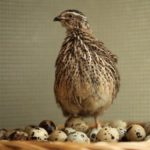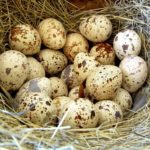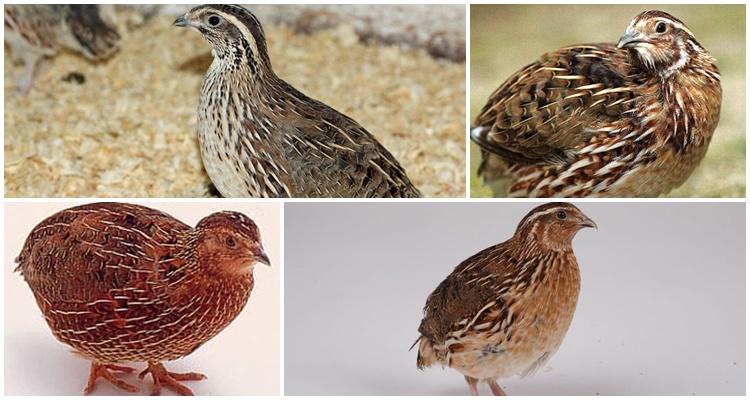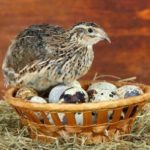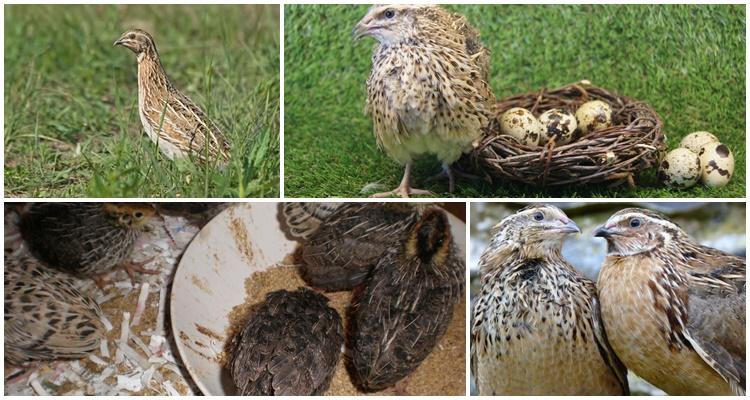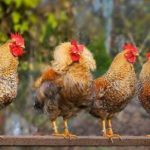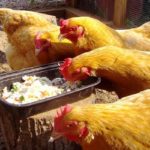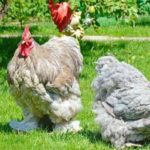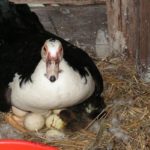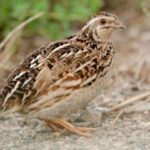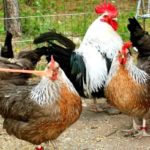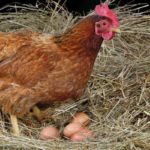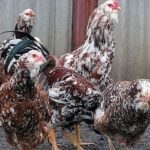Quails are excellent layers; the eggs of this bird are considered dietary, suitable for feeding sick people. Breeders have developed egg-laying breeds, the females of which are specially raised to produce egg products. Let's consider when quails begin to lay eggs, how many eggs can be obtained per day from one bird, the reasons for the decrease in egg production and how to improve it.
At what age do quails begin to lay eggs?
It depends on the breed, the first eggs can be obtained from young birds 40-50 days old.At first, females lay few eggs, then the functioning of the reproductive system improves.
Peak egg production occurs in the 5th-6th month after birth. Quails lay eggs steadily for up to 10-12 months, then productivity gradually decreases, although females can lay eggs for up to 3 years. But keeping them until such an age is not economically profitable. In many industrial farms and those where birds are raised at home, quails are replaced after the end of the first season.
The beginning of egg laying in different breeds
Small birds develop quickly; the start of egg laying can be expected 1.5 months after hatching. This age varies for different breeds, but varies slightly, a maximum of only 2 weeks.
For example, Manchurian quails begin to lay eggs at 40-45 days. Pharaohs, as a meat breed, are slightly inferior to the Manchus - they begin laying eggs on the 42-50th day of life. Texas quails will be able to please with the first “harvest” even later than Manchurians - on the 50-55th day. In a year, Texans can produce 270 eggs each, Manchus - 220-250, Pharaohs - 220 pieces.
How many eggs can a laying hen lay per day?
Productivity also depends on the breed; it varies between 200-300 pieces per year. To keep quails for eggs, breeds that produce at least 260 eggs per year are used. The number of eggs obtained is also influenced by the health of the bird and the conditions of detention. If they are unfavorable, the owner does not care for the quails well or they are sick, egg production decreases sharply or may stop altogether. Egg production is not affected by the time of year, but is strongly influenced by temperature, humidity and lighting in the poultry house.
Females usually lay eggs in the evening, at the same time. Japanese quails can lay eggs after feeding.
Why do they stop laying eggs?
As already mentioned, in old laying hens egg production drops and soon stops, but this happens for natural reasons, due to wear and tear of the body over time. A decrease can also be caused by stress from moving, changing males, the appearance of new individuals, or overpopulation. This kind of stress can slow down egg laying for a week. For a longer period, egg laying is interrupted by diseases and injuries, as well as by the period when birds molt.
Reasons for the decline in quail egg production
Young laying hens reduce productivity for external reasons. For example, they are thermophilic and will not fly in the cold. For stable egg production, the room temperature should be maintained at least 20 ° C and the humidity at 60%. Too dry or humid air, drafts also have an unfavorable effect. Lighting also plays an important role. The daylight requirement for quails is 18 hours. If this condition is not met, it will be problematic to wait for eggs from the females.
In the short term, quails may experience reduced productivity if their feed is changed. This is due to the fact that the birds’ bodies get used to it. A diet low in protein will also lead to decreased productivity.
How to improve egg production?
The main reasons why birds do not lay eggs well are considered to be poor feeding and improper living conditions. So, we need to analyze what was the negative factor and eliminate it.Cages with quails should only be placed in a heated room. In winter you will also have to maintain a constant temperature in it. This can be done using heaters or a wood-burning stove. Heat sources will also dry the air in the room and remove dampness.
To organize the correct lighting mode, it is advisable to install lamps that will turn on automatically. To do this, you need to configure the system to turn on and off on a schedule, so as not to do it manually. For lighting, you need to use low-power lamps that provide soft, muted light. The bright colors make the quails become aggressive, pecking each other until they bleed.
The area of the cells is important. Quails can be content with a very small living space, but they cannot be forced to live in cramped conditions. Overcrowding leads to stress and the spread of disease. For 1 sq. m. cage should not contain more than fifty birds. Laying hens should be kept separate from males, as it happens that cockerels peck females.
The volume of eggs laid by hens can be increased by good feeding. In order for a bird to have enough nutrients to produce an egg every day, it must obtain them from food. Each bird requires at least 30-35 g of feed per day; feed should be given 3 times a day. But you should not overfeed laying hens; if they are overweight, egg production does not increase, but decreases. Also, do not leave leftover food in the feeders if the birds have not eaten it. This will help build up your appetite before the next distribution.
You cannot suddenly change one product to another, or give mash or mixed feed of different compositions without a preliminary period of adaptation.It needs to be mixed in small portions with the usual food so that the quail’s body switches to it without stress. Compound feed for quails should be fresh and kept in closed bags. Old feed loses its properties. It is useful to feed laying hens with protein products and vegetable oils or ready-made premixes designed specifically for laying hens. This not only increases the total volume of eggs, but also the weight of each of them.
And, of course, you need to keep the quails clean. Clean trays in cages every day. Once every 1-2 months, remove birds from them, wash and disinfect them. If you remove droppings regularly, not only will there be no odor in the room, but the birds will also remain healthy.
To maintain health, it is also useful to carry out preventive treatment of livestock with antibiotics and antiviral drugs, without waiting for diseases to appear. To strengthen the immune system, give vitamins and fresh herbs.
Those who have decided to keep laying quails should know when they start laying eggs, how much you can get from a particular breed, and what volume of production you can expect. How to avoid serious mistakes in keeping and feeding in order to make a profit and not count losses. And what needs to be done so that laying hens show the full potential that breeders have invested in them.

